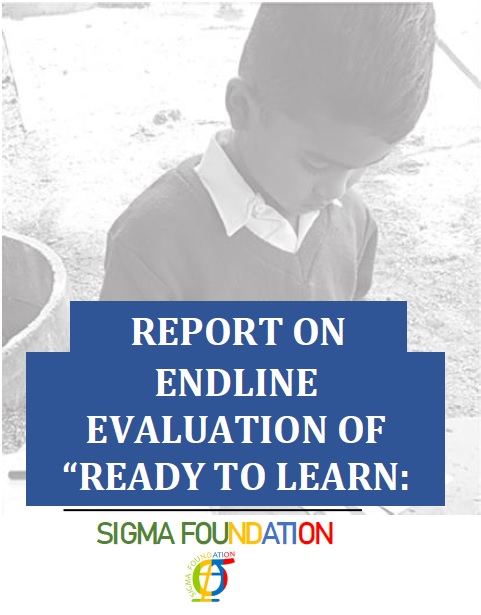Endline Evaluation of “Ready-to-Learn: Strengthening Quality of Learning for 3-6 Years old” in Khordha District, Odisha
Contributed By: Dr. M.N.Roy, Arundhati Roy, Pithona Das, Sanghamitra Kanjilal-BhaduriThe Endline evaluation focussed on the extent to which “Ready-to-Learn: Strengthening Quality of Learning for 3-6 Years old” has delivered effective, relevant, impactful and sustainable activities to its beneficiaries. The evaluation was conducted following the OECD-DAC criteria in the context of rural Khordha.
Save the Children designed a multipronged intervention at the level of ICDS functionaries, which includesAanganwadi Workers (AWW), Aanganwadi helpers (AWH), AWW Supervisors and parents of 3-6 years children in the respective Aanganwadi Centres (AWCs). The duration of the intervention was for 36 months (January 2019 to December 2021). The intervention aspires to enhance the overall school readiness of a child by improving the key domains of development namely, Emergent Literacy skills, Emergent Mathematics skills, Socio-emotional skills and Motor skills through a trickle-down model of change. The intervention attempted at enhancement of the overall learning environment and the access of resources at the level of AWCs and homes of children. Periodic training of stakeholders and promoting policy level advocacy to enhance quality of pre-school practices has been the most important focus of the intervention.
SIGMA Foundation was assigned the task of endline evaluation of the intervention. To evaluate this multipronged intervention a study had to be designed such that trickle-down effect can be captured with the framework of OECD-DAC criteria. A study thus designed, evaluated the extent of readiness-to-learn among children, the extent of child friendly learning environment in schools and at homes, the perception of changes in learning outcomes, relevance of the content and the training provided and the overall sustainability of the intervention in terms of stakeholder specific awareness about rationale of pre-school practices, challenges perceived in practice of quality pre-school activities. Mixed methods of analysis were undertaken to conclude on the overall findings of the report.
The study involved collection of quantitative data based on questionnaires from 1128 samples (705 students, 282 mothers and 141 Anganwadi Workers). Qualitative data was collected from four stakeholders namely, mothers, Anganwadi Workers, Officials at the ICDS project level and the Programme Coordinator of Save the Children. Further, some check-list based observations were made in 141 AWCs. The survey was completed in 3 weeks using Android run application developed by SIGMA Foundation using COBO Collect for easier data management. Special attention was given in terms of not compromising ethics of research.
The study shows how proper training of parents and AWW and AWW Supervisors can play a significant role in enhancing child-friendly interactions and promoting child-friendly learning environment at home and at AWC. These, in turn can significantly enhance development outcomes of a child aged 3-6 years. Among the developmental outcomes, socio-emotional skills and motor skills need more attention. Provisioning of materials and resources, as part of the implementation, at the level of AWC and homes has received significant appreciation across all the stakeholders. ICDS need to access the on-field requirement of such resources for a quality pre-school program. With a little investment in resources and periodic training functionaries a lot of improvement in pre-school learning levels is possible. However, challenges remain in terms of awareness building among the stakeholders, better supervision of AWC functioning, management of classroom activities and resources. Communication between AWW and their supervisors need to be improved so that field-specific challenges with regard to pre-school practices are easily identified and addressed efficiently.

